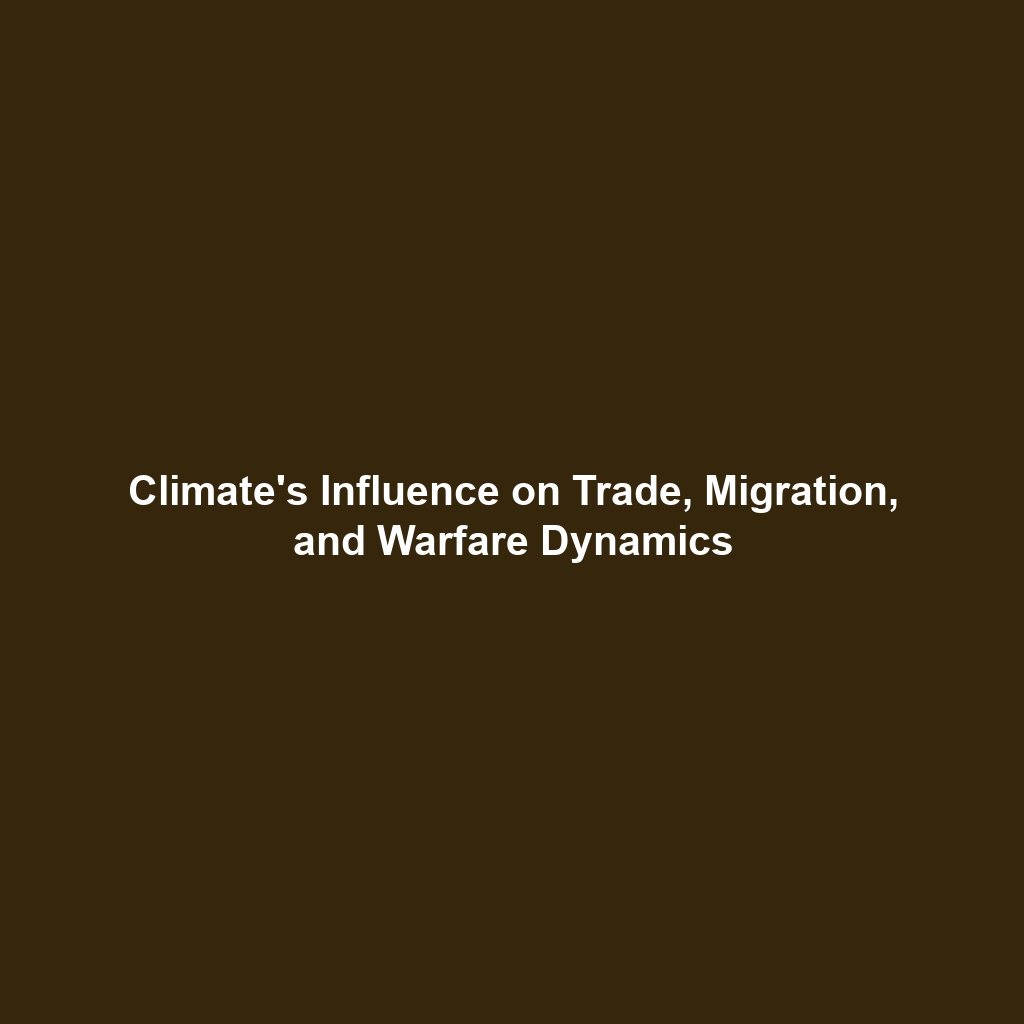The Role of Climate in Enabling or Limiting Trade, Migration, and Warfare
Introduction
The interplay between climate and human activity has been a driving force in shaping historical narratives. Understanding the role of climate in enabling or limiting trade, migration, and warfare is crucial within the broader context of Climate History. From the availability of resources to the hindrances imposed by natural disasters, climate has influenced human decisions and societal development. This article explores how varying climatic conditions have historically impacted these three key aspects of human civilization, offering insights into the significance of climate in the evolution of society.
Key Concepts
Climate Variability and Trade
Climate variability can significantly impact trade routes and economic exchanges. Favorable conditions promote trade by improving agricultural yields and ensuring the stability needed for long-distance commerce. Conversely, adverse climatic conditions can stifle economic activities.
Migration Patterns
Climate plays a pivotal role in migration, as communities often relocate in response to environmental pressures. For instance, droughts can compel populations to move in search of more sustainable conditions, altering demographic landscapes and cultural interactions.
Warfare and Resource Scarcity
Conflict often arises from competition for scarce resources, a situation exacerbated by changing climatic conditions. Climate history reveals numerous instances where droughts or floods have contributed to social tensions and conflicts dominating regions.
Applications and Real-World Uses
Understanding the role of climate in enabling or limiting trade, migration, and warfare can have significant applications in various fields:
- Policy Development: Governments can develop adaptive policies to mitigate the effects of climate on societal issues.
- Historical Research: Historians can utilize climatic data to draw correlations between environmental conditions and historical events.
- Humanitarian Efforts: Organizations can plan interventions based on historical migration trends influenced by climate changes.
Current Challenges
Studying the role of climate in enabling or limiting trade, migration, and warfare presents several challenges, including:
- Data Limitations: Historical climate data is often incomplete or inconsistent, making accurate analysis difficult.
- Complex Interactions: The multifaceted nature of climate impacts on human activity requires sophisticated modeling techniques.
- Regional Variability: Different regions experience diverse climatic impacts, complicating the formulation of universal theories.
Future Research and Innovations
Future research is poised to delve deeper into the role of climate in enabling or limiting trade, migration, and warfare. Upcoming technologies and methodologies include:
- Data Analytics: Advanced algorithms for climate modeling could greatly enhance the accuracy of historical climate reconstructions.
- Interdisciplinary Studies: The collaboration of climatologists, historians, and social scientists will yield a holistic understanding of climate impacts.
- Predictive Modeling: Innovations in predictive modeling could help forecast future societal changes in response to ongoing climatic shifts.
Conclusion
In summary, the role of climate in enabling or limiting trade, migration, and warfare is a critical aspect of Climate History. Understanding how climatic changes shape human interactions and societal frameworks is essential for addressing current and future challenges. As research continues to evolve, it is crucial for policymakers, historians, and the general public to engage with this area of study for better preparedness in the face of climate variability. For more insights, explore our related articles on climate impacts on human civilization and historical migration patterns.
